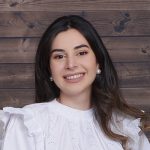If the uncanny valley describes the unsettling feeling of looking at something humanoid, then the same could be said about the way the world looks during an eclipse. The light is there but not right, as if someone took the exposure lens on the mind’s eye and lowered it. You wish you could increase the brightness of the scene with a double tap and dragging motion. The dimness of the world is not dusk or twilight, but an uncanny other. There have been two eclipses I have in my memory – the only two I was conscious about. The first was at ASU. Folks were passing out eclipse shades, and I remember standing out by Hayden Library, staring directly at the sky for minutes out in the open grass, a small burst of giddiness at being able to look at something I was not supposed to. The second was while I was in Fort Defiance, in the heart of the Navajo Nation, where I stayed buried indoors and avoided any temptation to gaze towards an open window.
I was in the middle of impaling Ruby’s abdomen with a catheter, draining out the straw-colored fluid surrounding her organs and crushing her lungs, when the elderly woman asked what I was doing for the upcoming eclipse. Once I felt the pop signaling a successful piercing through her peritoneum, I looked up questioningly. Dr. Begay had mentioned that the Navajo people were very superstitious regarding eclipses, but I had not found the time yet to read about the phenomenon while getting accustomed to my rural family medicine rotation. Under his watchful eye, I was doing my first paracentesis, a common procedure done at the clinic for patients who seemed to be plagued with swollen bellies and twine limbs from broken livers. We began to drain Ruby’s abdomen into glass flasks, the speed of the draining fluid telling us just how much pressure Ruby must have been feeling prior to her procedure. I answered honestly that I had no specific plans for the eclipse, but that I was curious to know what the customs were; that maybe I could participate in this sacred holiday. As her belly deflated, her words grew. It was not uncommon for conversations to be quite short with the native elders as they believed one should use as few words as necessary to express themselves, a nod to both humility and a judicious selection of words. She began to detail how one must never look at the eclipse. In fact, one should even avoid gazing towards the windows. There was to be no eating, no talking, no use of the restroom, just a silent reflection and stillness until the world’s light returned to normalcy. To look at the eclipse was to invite illness and misfortune into one’s life. She told me that she specifically set intentions for the safety of her loved ones during eclipses. We emptied nearly eleven liters from Ruby’s belly. It was miraculous that her blood pressure was still high enough to perfuse her body. As I wheeled her to get an infusion of albumin, I thanked her for her wisdom and the invitation to participate in the sacred ritual to come.
And when the world began to dim, I too tried to be diminished. I tried to quell the intracranial noise and my fidgeting limbs. I invited silence and intentional reflection. The next day, I wrote the following poem:
Phone call from mama when
The eclipse is done,
Talking together
About the transformation to come,
Hoping for happiness,
Some love or more light,
I stared at the ground,
Avoid a sight,
Of the mating in the sky,
Of the Sun and the Moon,
Together let’s signify,
A death and a bloom.
Natalie Nabaty is a medical student from the class of 2025 at UACOMP with so many passions she struggles to juggle them all. Between playing guitar, dancing traditional Assyrian line dances, and studying global health, writing is a skill she is happy to refine while in medical school. She graduated from ASU with a Bachelors in Biology and a minor in Psychology. Her special interests include migrant health, global neurology, and medical humanism.


